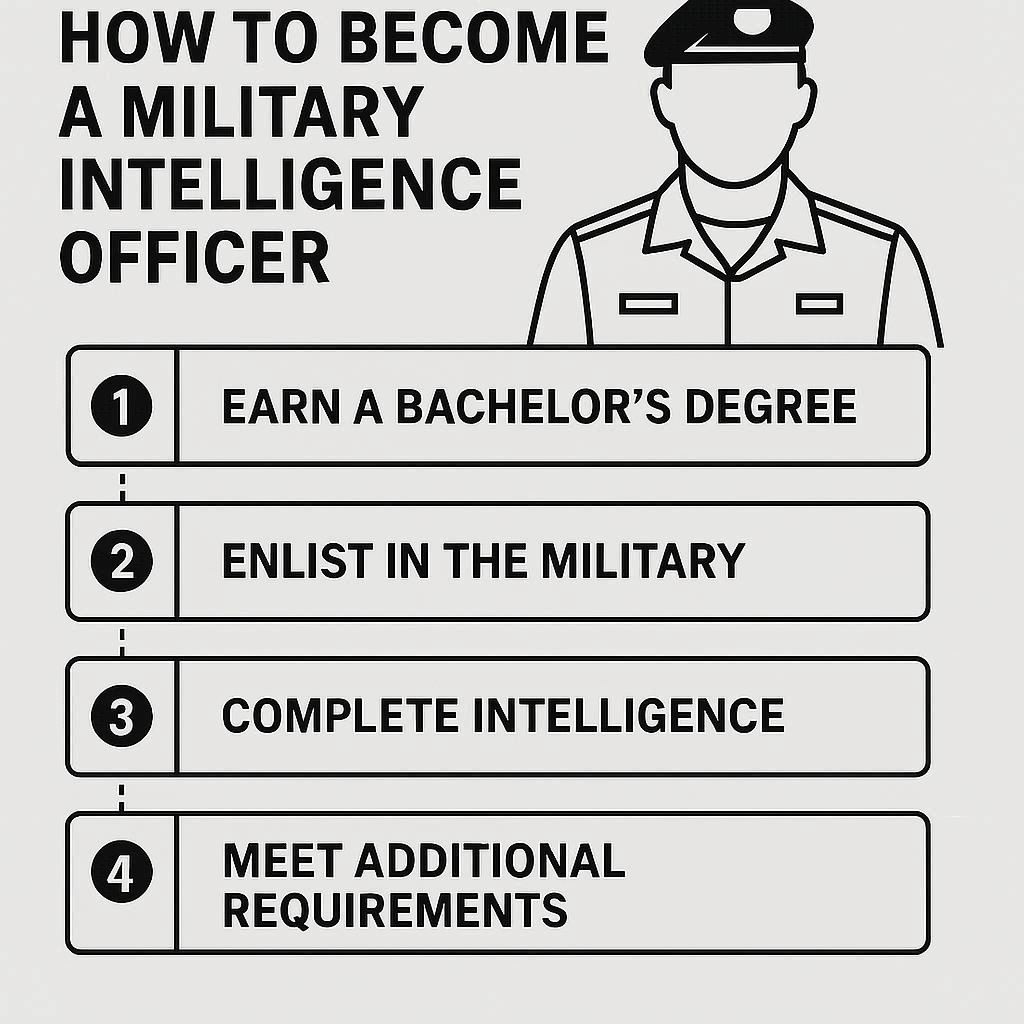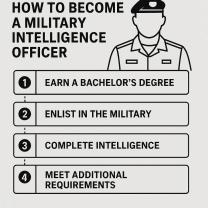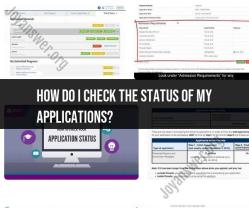How do you become a military intelligence officer?
Nice — here’s a clear, practical step-by-step guide to becoming a military intelligence (MI) officer (U.S.-focused but with notes for other countries). I’ll cover the common routes, training & clearance requirements, timeline estimates, and a short checklist so you can get started.
Becoming an MI officer generally means: (1) choose a service branch, (2) earn a commission (ROTC / service academy / OCS / direct commission), (3) meet service & fitness standards, (4) obtain a required security clearance (often Top Secret/TS-SCI), and (5) complete your branch’s MI officer training and follow-on schools (language, SIGINT/GEOINT/HUMINT, etc.).
Step-by-step plan
1) Choose your service & research the MI role there
Each service has its own MI officer job titles, entry requirements, and specialty areas (Army 35A, Air Force 14N, Navy intelligence designators, etc.). Pick the branch whose missions/units appeal to you (tactical army MI, Air Force ISR/analysis, naval intel for fleet/warfare support, etc.).
2) Meet the basic officer prerequisites
Typical requirements across services:
U.S. citizenship (most MI jobs require it).
Bachelor’s degree (or within one year of graduation) — most commissioned officer programs require a 4-year degree.
Age, medical & physical fitness standards vary by service (you’ll have to pass the commissioning physical).
Common commissioning routes:
Service academy (U.S. Military Academy / Naval Academy / USAFA) — 4 years + direct commission.
ROTC at college — commission on graduation.
Officer Candidate School (OCS) / Officer Training School (OTS) after college.
Direct commission for some skilled professionals (less common in MI except certain technical or language specialties).
All lead to branch-specific follow-on training.
3) Prepare academically and technically
Preferred majors: international relations/political science, regional studies, languages, computer science, engineering, mathematics, cybersecurity, data analysis, or similar — these make you competitive and relevant to MI work. Many services explicitly state preferred degrees for intel roles.
4) Expect and obtain a security clearance
Most MI officer jobs require Top Secret and frequently TS/SCI access; some positions require a full-scope polygraph. The clearance process includes an SF-86, background investigation, interviews, drug testing, and possibly a polygraph. Timelines vary: obtaining TS/TS-SCI can take several months to 12+ months depending on backlog and case complexity. Plan accordingly — clearances are a gating item before many MI assignments.
5) Complete branch MI officer basic training
After commissioning you’ll attend your branch’s initial MI officer course (example: Military Intelligence BOLC at Fort Huachuca for Army MI officers; that course is on the order of ~4 months). After BOLC/initial officer training you’ll go to your first unit assignment and may get additional follow-on specialty schools.
6) Follow-on training & specialties
MI officers often get additional specialized training: language training at Defense Language Institute (DLI), HUMINT/SIGINT/GEOINT courses, analyst tradecraft schools, cryptologic or cyber courses, and professional military education as they progress. Languages and technical skills boost assignment opportunities.
7) Build experience & advance
Field experience (platoon/company level for Army), joint assignments, interagency work, and advanced schooling lead to career progression into staff, analytic, or leadership roles within the IC and DoD. Cleared experience also opens doors to civilian IC jobs later (NSA, DIA, NGA, CIA, etc.).
Typical timeline (very approximate)
Education + commissioning: ~4 years (college + ROTC/service academy) or months if you commission via OCS after college.
Initial MI officer course (e.g., MIBOLC): ~3–5 months.
Security clearance: several months to >1 year (TS/SCI with polygraph can be longest). Start the SF-86 early and keep documents ready.
Quick checklist — what to do now
Decide which service fits you and read its MI officer recruiting page (Army / Air Force / Navy links below).
If you’re in college: take relevant majors/classes (languages, statistics, cybersecurity, regional studies), join ROTC if available.
Keep a clean background: limit foreign financial entanglements, disclose foreign contacts honestly, and be mindful of public social media — these affect clearance decisions.
Apply to internships/student programs with IC agencies (NSA/DIA/CIA) to gain relevant experience and networking.
Contact a recruiter from your chosen branch and ask specifically about MI officer boards, required tests (AFOQT/OAR/AFOQT equivalents), and timelines.
Helpful authoritative resources
Army — Military Intelligence Officer info (commissioning paths & MI careers).
Air Force — Intelligence Officer career page (requirements, AFOQT, degree guidance).
Navy — Naval Intelligence officer careers & minimums (degree, GPA guidance).
DIA / Intelligence Careers — Security clearance & IC student/internship programs.
Army DA Pam / MI Branch guidance (MIBOLC requirement & training).
Defense Language Institute (language training available to military/intelligence personnel).
Becoming a military intelligence officer is a competitive process that requires a strong academic background, specialized training, and a high level of personal integrity. These officers are responsible for collecting, analyzing, and disseminating intelligence to support military operations.
Education and Qualifications
To become a military intelligence officer, you must be a U.S. citizen and hold at least a bachelor's degree from an accredited four-year college or university. While no specific major is required, degrees in fields like political science, international relations, foreign languages, computer science, or engineering are highly desirable. Additionally, you will need to meet specific physical and moral standards and obtain a top-secret security clearance, which involves a comprehensive background check.
Training Programs
After earning a commission through a program like a military academy, ROTC, or Officer Candidate School (OCS), you'll attend a branch-specific basic officer leadership course. For military intelligence, this initial training is followed by a Military Intelligence Officer Basic Course (MIOBC). This course, often lasting several months, provides new officers with the foundational knowledge of intelligence disciplines, including:
Human Intelligence (HUMINT)
Signals Intelligence (SIGINT)
Imagery Intelligence (IMINT)
All-Source Analysis
The training combines classroom instruction with field exercises to prepare you for real-world scenarios.
Essential Skills for Success
A successful military intelligence officer needs a unique blend of analytical, technical, and soft skills:
Critical and Analytical Thinking: The ability to synthesize vast amounts of information from various sources to identify patterns, evaluate threats, and provide unbiased assessments.
Communication: Strong written and verbal communication skills are essential for creating clear reports, briefing commanders, and collaborating with other intelligence professionals.
Cultural and Geopolitical Awareness: A deep understanding of global events, foreign cultures, and international relations is crucial for interpreting intelligence and assessing its context.
Adaptability and Resilience: The intelligence landscape is constantly changing. Officers must be able to work under pressure in dynamic environments and adapt to new challenges.
Career Paths After Service
The skills and security clearances gained as a military intelligence officer are highly valued in the civilian sector. Veterans with this background often find lucrative careers in:
Federal Government Agencies: Working for agencies like the CIA, FBI, NSA, or the Department of Homeland Security.
Private Sector: Opportunities in corporate security, risk management, and cybersecurity for private companies.
Defense Contractors: Many former officers work for defense and intelligence contracting firms that support government operations.
Law Enforcement: Leveraging their investigative and analytical skills in local or federal law enforcement roles.













